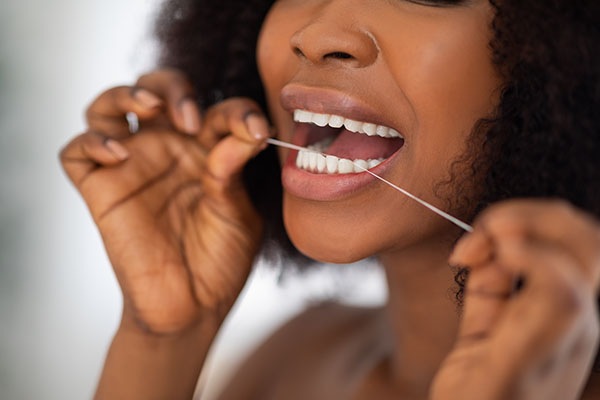 Flossing is an oral hygiene basic that everyone should know. Dentists recommend flossing at least once a day to keep the teeth healthy.
Flossing is an oral hygiene basic that everyone should know. Dentists recommend flossing at least once a day to keep the teeth healthy.
However, if it has been a while since you learned how to floss, you may need a refresher course. Here is a breakdown of recommended flossing techniques to help you maintain your beautiful smile.
How to floss
While brushing your teeth is also part of oral hygiene basics, brushing alone does not eliminate all bacteria and leftover food particles. The spaces between your teeth are too tight for the bristles to fit, so you end up missing the smallest pieces. These food particles become plaque, a thin film of residue on your teeth containing bacteria. This bacteria can cause tooth decay and gum disease, both painful conditions that can lead to tooth loss or worse.
Flossing lets you get at the food and plaque accumulating between your teeth. However, to be effective, you need to floss correctly.
1. Use the right length
The ideal floss length is between 18 and 24 inches. If you use less, you will not have enough to floss between each tooth. If you use more, you will have unused floss left over, which is wasteful. You may also have difficulty controlling the length.
2. Hold the floss correctly
You only need 1 to 2 inches for actual flossing, so wind the ends around your fingers and pull taut for maximum control. You should use a new section of thread for each space, so you will need to rewrap your fingers as you go.
3. Floss between your teeth
The most effective flossing technique is to move the thread in a "c" shape against the sides of your teeth. This movement follows the natural curve of the tooth, ensuring you do not miss any spots.
4. Be gentle around your gums
Because floss thread is so thin, it can accidentally slip between your gums and teeth. However, this can hurt your gums and cause them to recede. To prevent this issue, be gentle when flossing near the base of each tooth.
5. Be methodical
The best way to ensure you get every tooth is to start with the molars and work your way across each line of teeth. When you are done with one space, you may have food or plaque on the floss. Wipe this on a tissue before continuing to avoid spreading bacteria.
Why you should floss once a day
Oral hygiene basics may feel tedious, but they are an essential part of maintaining your health. According to the Mayo Clinic, individuals with gum disease are at a higher risk of developing other conditions, such as heart disease.
Conclusion
So, is it enough to only floss once a day? While dentists recommend once daily, you can floss more if you eat food that gets stuck in your teeth, such as popcorn. However, you should not floss too often, as it can irritate your gums.
Request an appointment or call Family Choice Dental at 505-634-5657 for an appointment in our Albuquerque office.
Related Posts
There are several options available to patients after losing a tooth. One of the more popular options -- and perhaps the longest-lasting solution – is implant dentistry. This involves the placement of one or more dental implants, followed by the attachment of abutments and a crown, bridge, or denture.Depending on the number of teeth that…
Implant dentistry offers a tooth replacement solution that looks and feels natural. This is due in large part to the implant, which fuses together with the jawbone and serves as the support and root of the replacement tooth. This review discusses the unique benefits of choosing implant dentistry to replace a missing tooth.The most notable…
Implant dentistry includes the entire treatment implant process, from the consultation visit to providing aftercare and educational services to ensure the implants remain in good condition. The following review discusses how you can get the most out of your dental implants through good aftercare practices.You can care for your dental implant restoration by implementing a…
